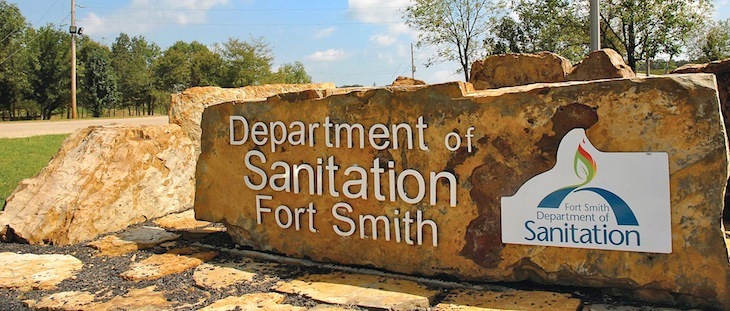Fort Smith recycling program resumes on June 26, city to look for a long-term plan
by June 25, 2017 1:10 pm 550 views

The city of Fort Smith will resume its recycling program on Monday (June 26), according to a Friday (June 23) press release. At a recent Fort Smith Board of Directors meeting, city directors signed off on an agreement with Third Rock Recycling, and partner Pen Sales, to begin delivering household recycled materials.
Third Rock confirmed at the meeting it could begin accepting materials as soon as it had signed a lease on a suitable facility, which, a representative said, could be as early as Wednesday (June 21). The agreement required the company to accept materials “within 30 days” of approval.
The city had not carried a contract with a recycling processor since October 2014. Since that time, “a significant portion of recyclable material has been disposed of in the city’s landfill,” the press release stated. Previous inquiries from Talk Business & Politics pinpointed the percentage disposed of at the landfill at just over 91% during the almost three-year period.
Effective Monday, all household recyclables collected by the Fort Smith Sanitation Department will be delivered to Third Rock “for processing, sale and reuse,” the city’s press release stated. The contract is for a two-year term, with the city’s option for a third year. Third Rock will charge the city $80 per ton of material delivered. Costs “will be absorbed in the department’s operating budget and will not require a specific adjustment to the monthly fee for residential collection service.”
The agreement will also cover sorted office paper (SOP) and old cardboard containers (OCC). The city typically collects about 300 tons of household single stream material per month, creating a monthly operating cost under the agreement of approximately $24,000 ($288,000 annually).
With SOP and OCC materials, Third Rock will purchase for $40 under the market rate, which fluctuates monthly, and is based on the “PPI Yellow Sheet,” published the fifth day of each month. The city’s price will be based on the Yellow Sheet’s “high-side of the southwest region,” which is currently $165 for June of 2017, meaning Third Rock would keep $40 per ton and return $125 per ton to the city.
As the city typically collects about 80 tons per month of OCC and SOP materials, the agreement will generate operating monthly revenue of approximately $10,000 ($120,000 annually, using June’s market prices). Considering both operations, the city will have a net expense of approximately $14,000 per month ($168,000 annually).
Third Rock plans to install baling equipment in the next three weeks. The material delivered starting Monday will be stockpiled inside the company’s facility until it can be compacted, baled and loaded for transport to a Materials Recovery Facility (MRF), where it will be sorted into the various recyclable commodities, which can then be marketed to mills for reuse.
The release continued: “Residents are encouraged to place their household recyclables in the recycling carts for curbside collection on their designated day. Items acceptable for inclusion in the household recycling program include newspaper, office paper, chipboard (such as cereal boxes), cardboard, plastics (especially plastic bottles), and metals such as steel or aluminum cans. Items should be as clean and free of contaminants as possible. Items that should not be included in residential recycling carts include glass, Styrofoam, and plastic grocery bags, or any contaminated items. These items should be placed in the regular trash collection carts.”
The city and Third Rock Recycling will investigate long-term solutions to make the city’s recycling program more sustainable, including the installation of sorting equipment in the local facility and the creation of the city’s own MRF at the landfill property.
The city had been delivering what it could to Green Source Recycling Center through late June 2016, when the Clarksville, Ark.-based facility chose to officially end the informal agreement due to degradation of the city’s materials.
